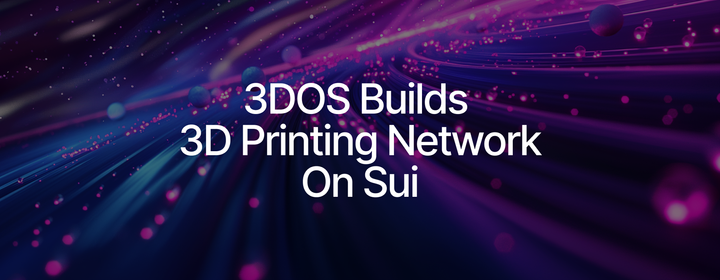Build Beyond: How to Think About Sui
A conversation with Janet Wu, Director of Product at Mysten Labs, about the unique features available for builders on Sui

On Tuesday we sat down with Janet Wu to discuss the product development process on Web3, what product use cases excite her most on Sui, and what she sees down the road for the industry.
Can you tell us a little bit about what it means to be Director of Product at Mysten Labs?
Product is more a mindset than a very specific set of roles and responsibilities. It's a combination of mindset and skill set, which is mainly around being the voice of the customer. And also making sure that the products we ship are, in fact, bringing customer satisfaction.
For my team, one member is focused on partner integrations, working with the developers at Mysten’s partners who are actually trying to get their projects integrated onto Sui. One person on my team is focused on validators. And then another person on my team is focused on everyday application developers. So in general, the people my team collectively tries to serve are more technical, the people who get into the nuts and bolts to make things work with Sui. That is the persona that we're aiming to serve well.
Sui has a lot of unique features already in production as well as coming in the next few months. What are you particularly excited about and also, since you do work with partners and developers so closely, what features have you noticed that they're latching on to and are excited about exploring?
Sui Mainnet is still young. Mysten Labs, Sui Foundation, and others are still in the process of getting the word out about how to use the unique capabilities on Sui. There is a bit of a learning curve to using Sui and we have to help people cross it.
I'm very excited about programmable transaction blocks. It is so powerful and so expressive, even compared to Web2 programming models. Sui's gas fee models are highly competitive and very attractive for all application developers. Our conversations with developers suggest they are used to what other chains offer and there is so much on Sui that they can take advantage of but don’t realize it exists or what can be done with it. So I'm really excited about seeing more adoption of PTB. I'm also very excited about some of the new things Mysten Labs is building around ZKLogin to make onboarding smoother and simpler, and actually productionizing that because it will address a very common pain point.
We've done a great job landing a set of innovations. So right now I am most excited about growth and adoption. And making sure that people can indeed use these things to build interesting, new, and compelling products.
What do you think needs to happen to help bridge that gap? Where do you think we need to push the community in order to help developers with that adoption?
You know, while I'm very focused on the technical developer journey, we all have the goal to create a sizable and vibrant ecosystem. So it's all about education and evangelism right now. There's so many chains out there. Why would you pick this new kid on the block? Every new chain shows up with new shiny things. Sui evangelists need to differentiate Sui in a way that does not sell the technology short but does not overwhelm newcomers to the ecosystem.
So when you're talking to developers, and just product builders in general, do you have a way that you address the features and how they should think about them?
It really depends on the audience we're speaking with. If we're speaking with somebody who's already been building on Ethereum, but is just exploring what new chains have to offer once in a while, I think for them, they often need to hear that Sui is 10x better. Because there's a migration cost, and to absorb that migration cost your technology cannot just be 2x better, it has to be 5x-10x better which I think Sui is. So we focus on landing the message of why this is worth that migration cost and is the right bet for the future. We talk about how low our gas fees actually are compared to Ethereum. We talk about the magic you can do with a native object-centric model and PTBs. So we focus on driving home that 5-10x better message.
If we're talking to people who are Web2 developers, then we focus on the digital ownership aspect that users are empowered with in Web3. And we try to make building products in Web3 just as easy as Web2. It is not that easy today. Web2 has a lot of tooling and platforms that's been well curated by smart people over the decades. And Web3 is a much younger and more nascent industry. So for them, we try to make it easy to explore and experiment. And there are a lot of things we want to do there.
Have you seen any great examples that show the power of what's possible with Sui, and why it's 10x better?
Real proof points are starting to show up. You know, like, when we talk about how low Sui's gas fees can get, we're starting to see partners doing some interesting experiments on Sui.
We also want to make it easy for developers on any other chain to come and just experiment and check out Sui. Sui’s high performance numbers, like the 300,000 TPS benchmark, while great and show the world that Sui is ready for the Web3 scale, don't immediately benefit someone who's starting to build an application. So we want to focus on making sure that early in their developer journey, they can quickly get interesting wins in different ways compared to building on other chains.
Would you say those wins tend to be on the developer side, meaning a simpler development process or, you know, a more secure development process? Or are they on the consumer side where the user actually has a better experience? Or is it both?
You definitely get security by design on Sui. But security is less tangible and one tends to feel the absence of it rather than the presence of it. Sui has features like sponsored transactions that some games are using in Mainnet. And that allows them to build an invisible experience where you don't see the blockchain. You don't have to download a wallet. You just play the game and then you have assets. If you choose to use the wallet you can but you don't have to. So it's a little bit of both for sure.
Moving out from Sui and looking at your experience in Web3 generally, how do you view product development? Is it different from Web2?
I would say our day to day engineering and product development process is not all that different. The biggest difference between Web2 and Web3 development is decentralization and governance. In Web2 development, everything is decided by the platform company, whether it's Facebook or Google or Apple. But in the Web3 world, we have other vocal technologists and product builders participate in the development process.
What does that look like?
There's a fairly established norm for this in the blockchain industry. Usually, there's an improvement process. It's very much modeled after open source, and then we as the initial contributors to the protocol's design facilitate the decision making and collaboration for the benefit of all players in the ecosystem.
When you look at the industries that might benefit from decentralized technology, and particularly when thinking about mass adoption, who are the prime candidates right now? Potentially even ones that people aren't talking about, ones that Sui can work for that other chains can’t.
The use cases I'm personally excited about for Sui are actually the low dollar value asset use cases. Because of how low gas fees are. Sui’s gas structure, which is enabled by owned objects, allows builders to be able to do things like create a $10 coupon and pay a fraction of a penny for gas fees. You can't do that on Ethereum. Nobody's gonna pay $10 in gas fees to mint a $10 coupon.
With tickets, there have been a lot of problems with resellers and fraud and secondary markets. So you can use Sui to issue a $50 ticket and pay very little gas fee. So I'm actually more excited about these kinds of everyday low asset use cases because that to me is the power of Web3. It’s conducting commerce on a Web3 platform in an open way.
Have you seen any brands that you feel are doing this well?
There's a lot of brands that are exploring Web3, but they're usually starting with consumer engagement and finding more novel ways of engaging with consumers. Starbucks launched its loyalty program with Polygon and has a digital membership where you can create unique interactions with your customers that you couldn't do before. Adidas is very forward thinking. Adidas has actual physical clothes lines that are developed for a Metaverse project they're working on, but they also have digital representations of outfits. So they've gone really far to tie together real life, real world goods and assets with digital assets. I've been quite impressed with what Adidas has done.
Different brands in different parts of the world are also exploring, APAC is very forward thinking and very creative when it comes to these things. Some of the big brands in Korea like the SK Group are also exploring how to create interesting engagements with Web3.
Many people say that crypto winter is a great time to build. Do you have any predictions about the types of products we might see in the next couple of years that are in the works now?
I see the momentum of building in the blockchain space continuing. Not just us, but a lot of chains are doing different things. People are trying to tackle onboarding more seriously, making it easier to bring the masses of consumers. A year ago there was some discussion of it in the space but it wasn't as active. Now we're seeing new Ethereum concepts like account abstraction, and people talking about making onboarding easier in different places. So a lot of innovation is still happening and the space is focused on the right problems, in my opinion.
To some extent, Sui has a shared fate with the other L1s, even though it is quite differentiated. Another builder getting a lot of traction bringing Web3 to the world also opens the door for Sui and vice versa. So I think the kinds of things that will likely get built are things that just make it easier for the consumers.
To build products that have really great UX for the consumers, you need really good platforms and developer tools.That's essentially what has happened in Web2. All these great platforms and frameworks were created so that anybody with a product idea can go from idea to product very quickly. So I think those two things will continue to push forward in the next couple of years.
When you're talking to people about Web3 and decentralized technology, is there a particular value that you highlight to them?
The thing that I tend to highlight, because I'm an infrastructure geek, is that this is an open platform and open source infrastructure that anybody can use and that isn't owned by anybody. And that's unique. You know, there's lots of infrastructures that exist that are fantastic. But they are either offered as a cloud provider, Google Cloud, or AWS or Oracle Cloud, or they are kept captive inside large companies. So this is actually the only infrastructure that anybody has access to and can use to build products. And that vision, you know, for me is very inspirational, because I see a lot of problems that these big platform companies have solved internally. But then I go to, you know, like my doctor's office or the DMV and I watch how they do things, and I feel like, wow, their life could be way easier if they had these great platforms.
If you were to translate the benefit of open access to great platforms for a consumer, how would you explain it?
I think the consumers are a couple steps removed from these great platforms. But sometimes they're also not. You look at a brand like Visa, right? Visa is the network but the consumer does not interact with Visa, on a day to day basis. They interact with a bank that is a partner of Visa, and a lot of their policies, their APR, their terms of service, it’s all dictated by the bank. It's not dictated by Visa. But customers know what Visa is, even though they don't interact with it. Going back a little bit earlier, there used to be a time when you bought a laptop, and there’d be like an Intel Inside sticker on top of it. How often does the consumer interact with the CPU inside a laptop? But they know and see Intel Inside even though they don't directly interact with Intel.
Is it the brand that people see or do they actually understand that it's a well constructed or trustworthy platform?
I think it's a little bit of both. Usually a brand implies a certain quality to the consumer, sometimes tangible, sometimes less tangible, depending on the sophistication of the consumer. There is a lot of precedent for these brands like Intel and Visa, and Sui can become such a brand. I don't think we're doing anything unusual there. There are lots of established brands that follow similar models and they work fine.
Any last thoughts on what we can look forward to from Sui or Mysten Labs?
Sui is still a very young chain and Mysten Labs is eager to serve our developer community well. Our DNA is in innovation and we will keep doing that for web3. We want feedback and we want to hear from builders and continue the active conversation.



